Essay on The Life of Holy Prophet Hazrat Muhammad (PBUH) | My Hero
Essay on the life of hazrat muhammad (صلی اللہ علیہ وسلم), my hero in history.
In this post, you will find an Essay on the Life of Holy Prophet Hazrat Muhammad (PBUH), My Hero in History. You can write the same essay under the title, Essay on the Holy Prophet (PBUH) or Essay on the Life of Hazrat Muhammad (PBUH). This is a simple and easy essay for the students of Class 10 and Class 12. Students of 2nd Year of F.A, FSC, ICS and Icom can get benefit from this essay. Life of Hazrat Muhammad (PBUH) is a role model for every Muslim. In this essay, we will discuss the whole life of Hazrat Muhammad (صلی اللہ علیہ وسلم) in short words. You can practice this essay as a course of your studies. If you are looking for more essays, you can visit English Essays Category .

Essay on The Holy Prophet, Hazrat Muhammad (صلی اللہ علیہ وسلم)
Our Holy Prophet (peace be upon him) was born in Makkah in the famous tribe of Quraish. His father, Abdullah died before his birth. So his mother, Amna Bibi looked after him. But she also died when he was only six years old. New, his grandfather, Abdul Muttalib took charge of him, but he did not live long. Finally, his uncle, Abu Talib looked after him and never left him alone in any hardship.
Our Holy Prophet (Peace Be Upon Him) married Khadija, a wealthy lady of Makkah when he was twenty-five years old. Hazrat Khadija handed over all her wealth to our Holy Prophet (peace be upon him) to spend for good and noble purposes. He helped the poor and needy. When our Holy Prophet (P.B.U.H) reached the age of forty he was commanded by Allah, the Almighty to preach Islam. Our Holy Prophet (P.B.U.H) started preaching that there is no God but Allah who is the creator of the universe and to whom all human beings would return.
The people of Makkah accepted Islam very slowly. In the beginning, only a few people accepted the new religion. The Makkans indeed became the sworn enemy of the Holy Prophet (P.B.U.H) and his follower. They created all sort of troubles for the Holy Prophet (P.B.U.H) but he stood firm. At last, they planned to kill the Holy Prophet (P.B.U.H) and he was compelled to leave for Medina where he was accorded a warm welcome by his followers. But the infidels did not allow him to live even there in peace. They fought several battles in order to wipe out the followers of Islam. However, Allah granted strength to our Holy Prophet (P.B.U.H) to defeat them and come out successful in his mission.
After ten years stay in Medinah, the Holy Prophet (P.B.U.H) came back to Makkah with ten thousand of his followers and conquered Makkah. On the day of his conquest, he could severely punish those who caused so much trouble and planned to kill him, but he excused everybody. After that, the new religion prospered by leaps and bounds.
Our Holy Prophet (P.B.U.H) returned to his Creator at the age of sixty-three. He left for his followers the Holy Quran and the Sunnah.
- More In English Essays
Essay Writing 101: The Basics That Every Writer Should Know

Students and Social Service Essay with Quotations

Load Shedding in Pakistan Essay – 1200 Words
Leave a reply cancel reply.
Your email address will not be published. Required fields are marked *

- Privacy Policty
- Terms of Service
- Advertise with Us
Muhammad was a prophet and founder of Islam.
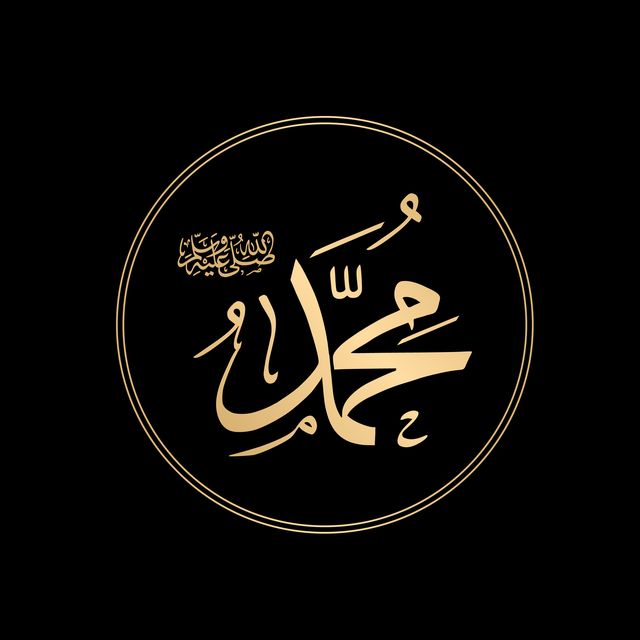
Who Was Muhammad?
Quick facts, the life of muhammad, the prophet muhammad, the death of muhammad.
Muhammad was the prophet and founder of Islam. Most of his early life was spent as a merchant. At age 40, he began to have revelations from Allah that became the basis for the Koran and the foundation of Islam. By 630 he had unified most of Arabia under a single religion. As of 2015, there are over 1.8 billion Muslims in the world who profess, “There is no God but Allah, and Muhammad is his prophet.”
FULL NAME: Muhammad ibn Abdullah ibn Abd al-Muttalib ibn Hashim BORN: c. 570 BIRTHPLACE: Makkah, Saudi Arabia DEATH: June 8, 623
Muhammad was born around 570, AD in Mecca (now in Saudi Arabia). His father died before he was born and he was raised first by his grandfather and then his uncle. He belonged to a poor but respectable family of the Quraysh tribe. The family was active in Meccan politics and trade.
Many of the tribes living in the Arabian Peninsula at the time were nomadic, trading goods as they crisscrossed the desert. Most tribes were polytheistic, worshipping their own set of gods. The town of Mecca was an important trading and religious center, home to many temples and worship sites where the devoted prayed to the idols of these gods. The most famous site was the Kaaba (meaning cube in Arabic). It is believed to have been built by Abraham (Ibrahim to Muslims) and his son Ismail. Gradually the people of Mecca turned to polytheism and idolatry. Of all the gods worshipped, it is believed that Allah was considered the greatest and the only one without an idol.
In his early teens, Muhammad worked in a camel caravan, following in the footsteps of many people his age, born of meager wealth. Working for his uncle, he gained experience in commercial trade traveling to Syria and eventually from the Mediterranean Sea to the Indian Ocean. In time, Muhammad earned a reputation as honest and sincere, acquiring the nickname “al-Amin” meaning faithful or trustworthy.
In his early 20s, Muhammad began working for a wealthy merchant woman named Khadijah, 15 years his senior. She soon became attracted to this young, accomplished man and proposed marriage. He accepted and over the years the happy union brought several children. Not all lived to adulthood, but one, Fatima, would marry Muhammad’s cousin, Ali ibn Abi Talib, whom Shi’ite Muslims regard as Muhammad’s successor.
Muhammad was also very religious, occasionally taking journeys of devotion to sacred sites near Mecca. On one of his pilgrimages in 610, he was meditating in a cave on Mount Jabal aI-Nour. The Angel Gabriel appeared and relayed the word of God: “Recite in the name of your Lord who creates, creates man from a clot! Recite for your lord is most generous….” These words became the opening verses of sūrah (chapter) 96 of the Qur'an. Most Islamic historians believe Muhammad was initially disturbed by the revelations and that he didn’t reveal them publicly for several years. However, Shi’a tradition states he welcomed the message from the Angel Gabriel and was deeply inspired to share his experience with other potential believers.
Islamic tradition holds that the first persons to believe were his wife, Khadija and his close friend Abu Bakr (regarded as the successor to Muhammad by Sunni Muslims). Soon, Muhammad began to gather a small following, initially encountering no opposition. Most people in Mecca either ignored him or mocked him as just another prophet. However, when his message condemned idol worship and polytheism, many of Mecca’s tribal leaders began to see Muhammad and his message as a threat. Besides going against long standing beliefs, the condemnation of idol worship had economic consequences for merchants who catered to the thousands of pilgrims who came to Mecca every year. This was especially true for members of Muhammad’s own tribe, the Quraysh, who were the guardians of the Kaaba. Sensing a threat, Mecca’s merchants and leaders offered Muhammad incentives to abandon his preaching, but he refused.
Increasingly, the resistance to Muhammed and his followers grew and they were eventually forced to emigrate from Mecca to Medina, a city 260 miles to the north in 622. This event marks the beginning of the Muslim calendar. There Muhammad was instrumental in bringing an end to a civil war raging amongst several of the city’s tribes. Muhammad settled in Medina, building his Muslim community and gradually gathering acceptance and more followers.
Between 624 and 628, the Muslims were involved in a series of battles for their survival. In the final major confrontation, The Battle of the Trench and Siege of Medina, Muhammad and his followers prevailed and a treaty was signed. The treaty was broken by the Meccan allies a year later. By now, Muhammad had plenty of forces and the balance of power had shifted away from the Meccan leaders to him. In 630, the Muslim army marched into Mecca, taking the city with minimum casualties. Muhammad gave amnesty to many of the Meccan leaders who had opposed him and pardoned many others. Most of the Meccan population converted to Islam. Muhammad and his followers then proceeded to destroy all of the statues of pagan gods in and around the Kaaba.
After the conflict with Mecca was finally settled, Muhammad took his first true Islamic pilgrimage to that city and in March, 632, he delivered his last sermon at Mount Arafat. Upon his return to Medina to his wife’s home, he fell ill for several days. He died on June 8, 632, at the age of 62, and was buried at al-Masjid an-Nabawi (the Mosque of the Prophet) one of the first mosques built by Muhammad in Medina.
Fact Check: We strive for accuracy and fairness. If you see something that doesn't look right, contact us !
The Biography.com staff is a team of people-obsessed and news-hungry editors with decades of collective experience. We have worked as daily newspaper reporters, major national magazine editors, and as editors-in-chief of regional media publications. Among our ranks are book authors and award-winning journalists. Our staff also works with freelance writers, researchers, and other contributors to produce the smart, compelling profiles and articles you see on our site. To meet the team, visit our About Us page: https://www.biography.com/about/a43602329/about-us

Famous Religious Figures
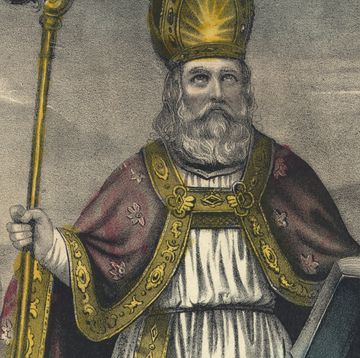
7 Little-Known Facts About Saint Patrick
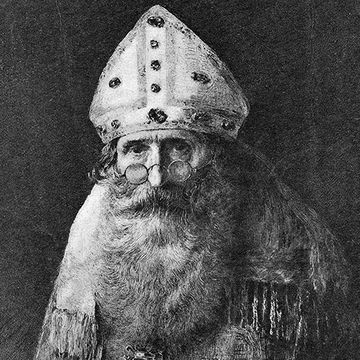
Saint Nicholas
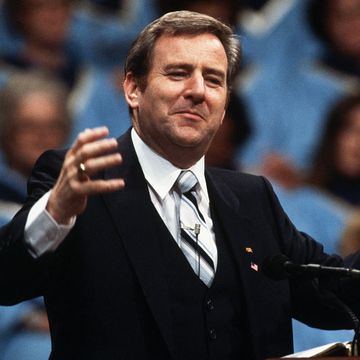
Jerry Falwell
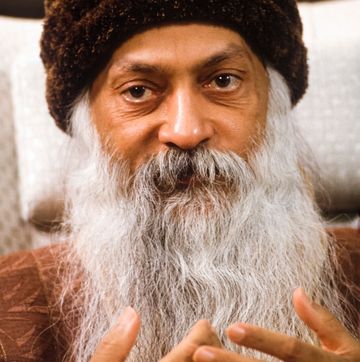
Bhagwan Shree Rajneesh
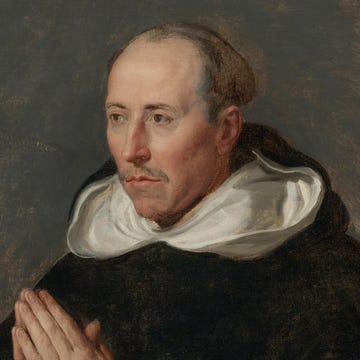
Saint Thomas Aquinas
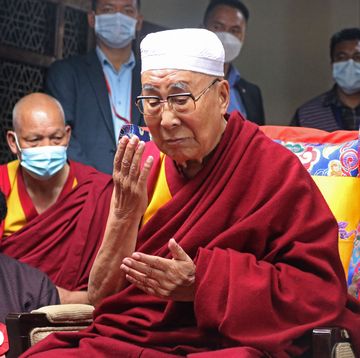
History of the Dalai Lama's Biggest Controversies
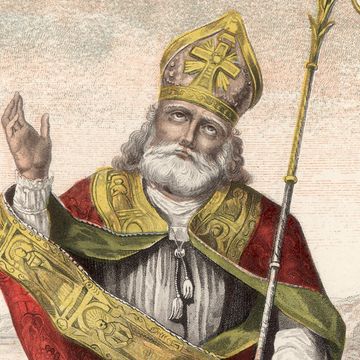
Saint Patrick
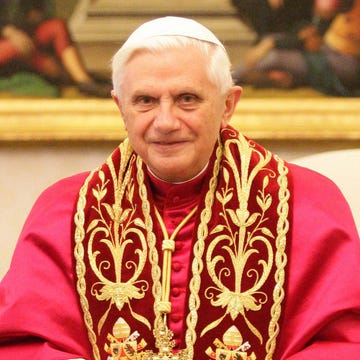
Pope Benedict XVI
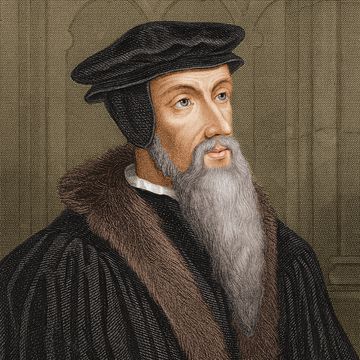
John Calvin
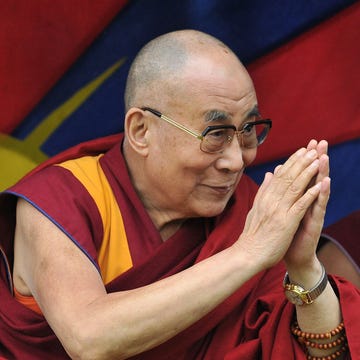
Pontius Pilate
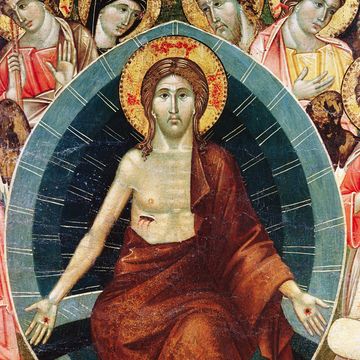
Jesus Christ
- Publish your article
The Prophet’s Life in Brief
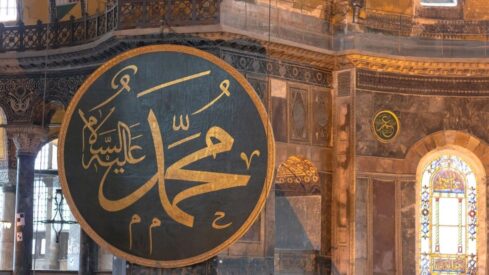
Birth and Rearing
Muhammad was born in Makkah on Rabi` Awwal 12, 570 CE. His father died before his birth. The infant Muhammad was handed to a Bedouin wet nurse to be brought up by her in the healthy atmosphere of the desert. At the age of five, Muhammad returned to the care of his mother, Aminah bint Wahb, but she died a year later. Muhammad then went to his paternal grandfather, `Abdul Muttalib. He died when Muhammad was eight, and the boy was then brought up by his uncle Abu Talib. At the age of twelve, he accompanied his uncle in a merchant’s caravan to Syria.
As a Young Man
Muhammad was content to work as a shepherd, but his uncle Abu Talib desired something better for him and obtained him employment with a rich widow, Khadijah bint Khuwaylid ibn Asad. Thus Muhammad found himself at the age of 25 in charge of a caravan conveying merchandise to Syria. On his return, Khadijah was so pleased with his successful management of her business and was so attracted by his noble character that she sent her sister to offer the young man Khadijah’s hand. Muhammad had felt drawn to Khadijah, and so matters were soon arranged. Their 26 years of married life were singularly happy. Muhammad continued to work as a merchant. His fairness further enhanced his reputation as “Al-Amin” (The Trustworthy). He continued to take an ever-increasing interest in public affairs and to exert himself in the service of the poor, the helpless, and the weak.
In the Cave
Whenever the iniquities of his people oppressed him, Muhammad retired to the solitude of a cave in Mount Hira’ outside Makkah. There his soul tried to peer into the mysteries of creation, of life and death, of good and evil, to find order out of chaos. Solitude became a passion with him, and every year he would retire to the cave for the whole month of Ramadan to mediate.
First Revelation
It was on one of these occasions, when he was 40 years of age, that Muhammad received the call. One night, while lying absorbed in his thoughts in the solitude of the cave, Muhammad was commanded by a mighty voice to go forth and preach. Muhammad rose trembling and hastened home to seek rest and solace in Khadijah’s tender care, and she calmed and comforted him. She later consulted her kinsman, Waraqah ibn Nawfal. He declared that the heavenly message that had come to Moses had now come to Muhammad, and that he was chosen as a prophet of Allah.
First Converts
Khadijah was the first to accept the truth of Islam. Muhammad then communicated his experience to his cousin `Ali, his adopted son Zayd, and his intimate friend Abu Bakr . The Prophet began by preaching his mission secretly first among his intimate friends, then among the members of his own tribe, and thereafter publicly in the city and suburbs. The Quraysh tribe were the guardians of the Ka`bah , which was a source of great prestige and profit to their city, Makkah. They were, therefore, seriously alarmed and became actively hostile towards Muhammad.
Hijrah to Abyssinia
The fury of the people of Makkah knew no bounds. Muhammad was subjected to insults, to personal violence, and to the bitterest persecution, and his converts were most relentlessly oppressed, persecuted, and tortured. Therefore, in the fifth year of his mission, Muhammad advised them to leave the country and seek refuge from the persecution of the idolaters among the Christian people of Abyssinia. Muhammad and a few stalwart followers remained in Makkah and suffered untold misery and oppression, but still their number continued to increase.
The Boycott
The Quraysh outlawed Muhammad and asked his clan to forgo their right to avenge his blood. The proud clansmen refused to give up the right at the bidding of the people of Makkah, who thereupon boycotted them. After three years, the ban was lifted. A year later, Muhammad lost his uncle Abu Talib and his wife Khadijah. The death of Abu Talib removed the last check on the Makkans’ violence. Persecution grew ever fiercer, and Muhammad sought refuge in the neighboring city of Ta’if, where he was met with great hostility and barely escaped with his life.
Hijrah to Madinah
Muhammad took council with his Makkan followers, and it was decided that they should immigrate to Madinah. They left gradually and unobtrusively, Muhammad remaining to the last. Their departure was soon discovered by the Quraysh, who decided to slay Muhammad before he, too, escaped. They, therefore, cast lots and chose forty men, one from each clan, who took a solemn vow to kill Muhammad. They were to strike simultaneously so that the murder could not be avenged on any one clan. But on the night they were to kill him, Muhammad left Makkah with Abu Bakr.
Muhammad was now free to preach, and his followers increased rapidly. The Muslims could now worship freely and live according to the laws of Allah. But the people of Makkah were not going to allow Muhammad’s movement to take root in Madinah. They organized three great expeditions against the city, but all were beaten back.
Treaty of Hudaybiyah
Eventually the Makkans and Muslims concluded the Treaty of Hudaybiyah to maintain peace and to observe neutrality in their conflicts with third parties. According to the treaty, the Muslims were to return to Madinah that year without performing the pilgrimage , but they could come to do that the following year when the Quraysh would vacate the city for them for three days.
Back in Makkah
It was not until AH 8 that the Muslims were able to put an end to this war by gaining a bloodless victory over Makkah when the Makkans violated the terms of their treaty. The people of Makkah, who had relentlessly oppressed Muhammad and his followers for 21 years, expected dire vengeance, but in the hour of their defeat, they were treated with the greatest magnanimity. “Go, you are free!” were the words with which Muhammad gave them general amnesty. The Prophet removed all the idols in and around the Ka`bah, saying, [The Truth has come and falsehood vanished] (Al-Israa’: 81) and the Muslim call to prayer was heard in this ancient sanctuary.
In AH 10, Muhammad went to Makkah as a pilgrim, and he felt it was for the last time because the revelation he received there included the verse [This day have I perfected your religion for you…] (Al-Ma’idah: 3). On his return to Madinah, he fell ill of a mortal fever. It lasted for 15 days, but he continued to lead the prayers until 3 days before his death, when he deputed Abu Bakr. At early dawn on the last day of his earthly life, Muhammad came out from his room beside the mosque and joined the public prayers, but later in the day he died. The end came peacefully; murmuring of pardon and the company of the righteous in Paradise, the Prophet of Islam breathed his last, at the age of 63, on Rabi` Awwal 12, AH 11.
After his death, his followers faithfully carried the message of Islam, and within 90 years, the light of Islam reached Spain, North Africa, the Caucasus, China, and India.
All articles published not necessarily the official points of view held by islamonline

Discover how Prophet Muhammad championed knowledge and education, leading to an era of enlightenment in Islam. Learn about his teachings on intellectual growth, science, and the pursuit of knowledge.

What does humanity as a whole find in the prophet Muhammad's characters? What makes his character a role model not just for believers but for anyone searching for the “perfect human”?
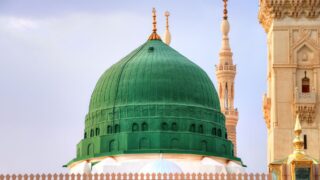
The article delves into the truthfulness of Prophet Muhammad's prophethood, addressing common misconceptions and providing evidence to support his divine mission.

Situated approximately 24 km northwest of Mecca lies Jirana, a location steeped in historical significance. “Do not be like the woman who breaks the thread after she is strong, and we leave her with many strands” (Quran 16:92). This verse serves as an allegory for those who betray their covenant with Allah. The woman referenced
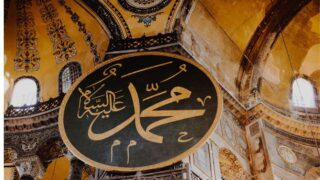
Allah gifted His servant prophet and Messenger (peace and blessings be upon him) with all sublime morals. In this context, Almighty Allah says: [And surely thou hast sublime morals] (Al-Qalam 68:4). On his part, the Messenger of Allah (peace and blessings be upon him) said, “I was sent (by Allah) to perfect the sublime morals.”
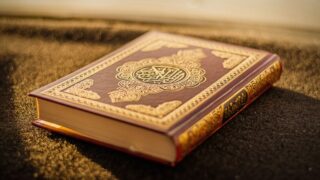
It is by Allah's grace that you have dealt gently with them. Had you been harsh and hard- hearted, they would surely have broken away from you

World History Edu
- Prophet Muhammad
Life Story of Prophet Muhammad: the Last Messenger of God in Islam
by World History Edu · October 9, 2019
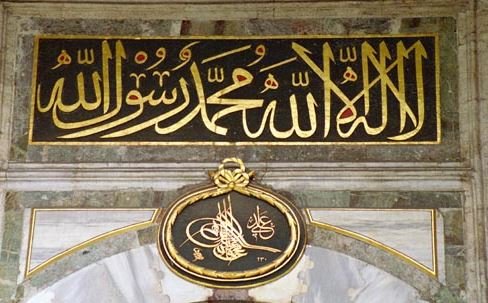
“There is no god except Allah and Prophet Muhammad is the Messenger of Allah.” | The Muslim profession of faith, inscribed on the Topkapi Palace (Turkey).
The Prophet Muhammad is widely regarded as the bedrock of the Islamic religion. Muslims across the world hold him in high regard and view him as a righteous messenger to whom God (Allah) revealed the Quran (Koran). Growing up in Mecca, Saudi Arabia, Muhammad’s date of existence is usually quoted as roughly 570-632 CE. Below, we present the full life story of the Prophet Mohammad (Peace be on to Him):
The Prophet Muhammad’s Birth
The Islamic founder’s birth occurred in the year 570 CE, Mecca. He was born to Abdallah ibn Abd al-Muttalib and Aminah bint Wahb. Unfortunately, Muhammad never saw his father with his own eyes – his father died before he came into the world. His family background and tree can be traced to the Quraysh tribe.
After the Prophet’s birth, his mother immediately knew that she had given birth to a great son. Aminah shared memories of the day she put the baby Muhammad down on the floor. According to her, the child directed his head towards the sky and gazed at the horizons, prophesizing one God (Allah). A voice then spoke out to her – ” you have given birth to a great one, he shall be called Muhammad”.
Muhammad’s paternal grandfather was called to pay a visit to the newborn. When he arrived, Abdul-Mutalib took the baby to the Kaaba and said some prayers to Allah. The Kaaba is a cube-shaped stone building in Mecca. Upon Muttalib’s return from the Kaaba, the great baby boy was named Muhammad.
Less than 7 years after his birth, Muhammad was fully orphaned when Aminah passed away. His grandfather Muttalib took care of him as a guardian. Fully aware of the child’s great religious future, Muttalib specially treated Muhammad with all the goodness he could afford. It has been said that Muttalib even cared for Muhammad better than his own wards. This was because he had high faith in him.
At about age 8, another disaster struck little Muhammad. His grandfather Muttalib was called to eternal rest. For the rest of his upbringing, Muhammad was then cared for by Abu Talib, Muhammad’s uncle. His uncle was very protective of Allah’s messenger – he stood by him during his trying times until death separated them.
Early Life in Mecca
Muhammad’s family lines had strong trade ties and political influence in Mecca. During Muhammad’s birth era, most of the Arabians were nomadic people who traded goods across the desert. Their religious beliefs were largely that of polytheism. They believed and worshiped all sorts of gods (idols).
Deep within the city of Mecca, idol worshiping was no exception. Dozens of temples and shrines served as worshiping grounds for devout worshipers who either had no idea or didn’t believe in one God.
Of all the worshiping sites, the Kaaba was the most famous ground. Islam followers believe that the Prophet Abraham (Ibrahim) was the one who built the Kaaba. In Arabic, Kaaba means “a cube”. Though numerous gods were worshiped in Mecca, Allah stood tall among the rest. He was the only true God that was not affiliated with idols.
During his teenage days, Muhammad partook in the nomadic lifestyle of his people. They used camels and crisscrossed deserts to trade for their livelihood. To some extent, Muhammad came from a less privileged family background. He joined his uncle on commercial voyages to Syria, and across the Mediterranean and then the Indian Ocean. Muhammad’s trustworthiness earned him the name “al-Amin”.
Prophet Muhammad Marries Khadijah
When he reached his twenties, Muhammad worked with a rich businesses woman by name Khadijah. Muhammad was 15 years younger than her. Their merchant dealings soon progressed into a strong bond of affection.
Khadijah, a wealthy widow, was all in to having Muhammad as a spouse, so she proposed marriage to him. Muhammad welcomed the idea and their union was blessed with plenty of fruits. However, not all their children made it into adulthood. Some died prematurely.
Controversially, in his energetic youthful days, Khadija was Muhammad’s only wife. His monogamous marriage was very unusual at that time, given the widespread polygamy that characterized his immediate environment. However, he later remarried other women when his first wife Khadijah died.
One daughter of his (Fatima) lived on and married Ali ibn Talib, a cousin to Muhammad. An Islamic branch called the Shi’ite Muslims have long maintained that Ali was the true successor of Prophet Muhammad.
Life and Meditation in the Cave
Muhammad grew up and loved to explore religious realms. He was far advanced in seeking to know Allah and truly understanding Allah’s mercies. In one such journeys, Muhammad discovered a cave called Hira in the mountain Jabal al-Nour. He found the cave convenient for religious meditations. He frequently visited the isolated hideout and got himself lost in contemplation of the Almighty and Magnificent Allah.
It has been alleged that Angel Gabriel visited Muhammad at the cage. The cave in someway manifested Muhammad’s level of spiritual commitment. Seated at the north of the mountain’s top, the question of how Muhammad discovered that isolated world is one that can’t be answered by an ordinary mind. To discover such a wonderful cave, many Islamic scholars and religious authors believe that it definitely took divine guidance and mercy.
Prophet Muhammad’s Spiritual Encounter with the Divine
Once he entered the cave, Muhammad lived in a separate world of his own. Apart from the sky view and the mountain surroundings, nothing else was visible to the naked eye. Shielded from external acoustic interference, everything was between Muhammad and the Merciful Allah. This gave the Prophet Muhammad’s mind the right atmosphere to think about things beyond the materialistic world.
At 40 years old, Muhammad was still in the mysterious cage when he had a spiritual encounter with Allah. It was here that he was presented with verse 1 of the Qur’an. After this revelation, Muhammad didn’t remain the same. It was a turning point in Islamic history.
In the space of 2-3 years after the Quranic revelation, Muhammad preached monotheism to his people. At first, he preached privately to people he trusted. He later mustered courage and took Allah’s messages to the streets. And bingo, the Islamic religion was birthed. More and more people slowly joined Muhammad in praising Allah. They embraced Allah as the ever Merciful and the ever Gracious.
Sanctions and Persecutions
Since his new religion was founded in the hearts of an idol-worshiping society, it didn’t exist without some sort of hindrance or persecutions. The expansion of Islam brought forth life-threatening hostilities towards the Prophet and his followers. Not everyone saw him as a God-sent messenger.
From the onset, Muhammad was an enemy to many sections of idol worshipers in Mecca. They abused him verbally, physically and in many other ways. But his uncle Abu Talib had his back and defended Muhammad. So he carried on with his evangelism ( Jihad ).
By choosing Allah against the will and traditions of the inhabitants of Mecca, things took a dangerous turn in the form of sanctions, persecutions, and wars, after the revelation. Some of the Islamic converts who were held as slaves were tortured or murdered.
The Prophet Muhammad flees to Abyssinia
The idol-worshipers rose up against the Prophet Muhammad’s followers. By 614 CE, the severity of the persecution forced Muhammad to direct his fellow Muslims to flee to Abyssinia for protection. Abyssinia was a Christian Kingdom in Ethiopia. They had a just king who was hospitable to the Muslims. The Quraysh people reportedly tried to bribe the Abyssinian king to sacking the Muslims, but their wicked efforts failed.
A year after the successful migration of some Muslims to Abyssinia, the Quraysh people put up sanctions and targeted Prophet Mohammed’s family, his activities, and his followers. As a result of the sanctions, Muslims moved and settled at the site of a Meccan mountain. The sanctions flopped in 618-619 CE, after 3 years.
More Troubles, plus the Loss of His Wife and Uncle
Soon afterward, Muhammad lost his dear wife Khadijah. More troubles set in when his uncle also passed away. The Prophet suffered more persecutions from the enemies who were hell-bent on eroding Islam. The intensified persecutions necessitated a pilgrimage in 622 CE. The Prophet met with elderly leaders from Yathrib City and they pledged their protective support to Muhammad.
When the plan leaked out to the Quraysh people, the Yathribs had to quickly move back to their home. Sensing the impending threat, the Prophet instructed his people to secretly emigrate to Yathrib. In response, the Qurayshites plotted to have him killed as soon as possible. The Quraysh tribes collectively planned to carry out the murder in the night time when the Prophet would be asleep.
The Prophet Muhammad’s Pilgrimage from Mecca to Medina
Fortunately, Allah saved Muhammad from death at the last minute. On the night of the planned murder, Allah instructed him to leave Mecca immediately and make his way to Yathrib. The Prophet did as Allah had instructed. When he safely departed from Mecca to Yathrib, Yathrib was renamed as “al-Madina” or Medina. This famous emigration of the Prophet is called the Hijra .
The date of this important event is given as 622 CE. It happened about 12 years after the revelation of the first Quranic verses. The Prophet’s escape to Medina has significant implications in the Islamic world. It helped the Islamic religion to establish a strong foundation. The prophet lived in Medina for up to 10 years, before he left the world.
Significant Battles and Treaties
In the following years (624-628 CE), many battles were fought by the Muslims for their lives. The most significant battles were the Battle of Badr and the Battle of the Trench. These were followed by the Siege of Medina, which resulted in a peace treaty between the Meccans and Muhammad’s followers.
When the Meccans broke the treaty, another war broke out. In 630 CE, Muhammad’s Muslim army was able to counter and defeat the Meccans pagans without fighting to the extreme.
By this time, Muslim numbers had grown significantly. Prophet Muhammad pardoned his oppressors. As a sign of good fate, or perhaps with Allah’s intervention, the Prophet’s former foes willingly converted to Islam. The Muslim community then collected and destroyed all pagan items (idols) close to the sacred Kaaba.
Death of Prophet Muhammad and His Burial Place

“Prophet Muhammad, the Messenger of God” inscribed at the entrance of the Prophet’s Mosque (Al-Masjid an Nawabi) in Medina, Saudi Arabia.
After resolving the conflicts with the pagans, Prophet Muhammad ( peace be unto him ) took his pilgrimage back to Mecca. In March of 632 CE, on Mount Arafat, the Prophet gave out his last sermon. He later went back to Medina. There, a deadly illness attacked him and he sadly never recovered.
On 8th June 632, the Prophet Muhammad (in his early 60s) took his last breath. There are conspiracy theories that the Prophet was poisoned. To date, there is no evidence to support such claims. Prophet Muhammad was buried at a mosque in Medina, the al-Masjid an Nawabi (present day Medina, Saudi Arabia).
He is regarded as the “Last Prophet”. Muhammad teachings are summarized as the Hadiths. With regard to the Sunnah, they talk about the prophet’s exemplary lifestyle. Muslims believe that Muhammad was the only Prophet who saw both heaven and hell before dying.
Tags: Mecca Medina Muhammad's Pilgrimage Prophet Muhammad's death Prophet of Islam World Faiths
You may also like...

Khadija bint Khuwaylid: The First Wife and the First Follower of the Prophet Muhammad
September 6, 2024

Who were the wives of Prophet Muhammad?
Leave a reply cancel reply.
Your email address will not be published. Required fields are marked *
Save my name, email, and website in this browser for the next time I comment.
- Next story Elizabeth II’s Remarkable Coronation Ceremony: History and Facts
- Previous story The Lighthouse of Alexandria: Why and how was it Built?
- Popular Posts
- Recent Posts

The End of Japanese Occupation in Singapore

Cyclopes in Greek Mythology: Origin Story & Other Major Myths

What was the Saint-Mihiel Offensive in 1918?

Dome of the Rock

Robert Penn Warren

Greatest African Leaders of all Time

Queen Elizabeth II: 10 Major Achievements

Donald Trump’s Educational Background

Donald Trump: 10 Most Significant Achievements

8 Most Important Achievements of John F. Kennedy

Odin in Norse Mythology: Origin Story, Meaning and Symbols

Ragnar Lothbrok – History, Facts & Legendary Achievements

9 Great Achievements of Queen Victoria

Most Ruthless African Dictators of All Time

12 Most Influential Presidents of the United States

Greek God Hermes: Myths, Powers and Early Portrayals

Kamala Harris: 10 Major Achievements

Kwame Nkrumah: History, Major Facts & 10 Memorable Achievements

8 Major Achievements of Rosa Parks

How did Captain James Cook die?

Trail of Tears: Story, Death Count & Facts

5 Great Accomplishments of Ancient Greece

Most Famous Pharaohs of Egypt

The Exact Relationship between Elizabeth II and Elizabeth I

How and when was Morse Code Invented?
- Adolf Hitler Alexander the Great American Civil War Ancient Egyptian gods Ancient Egyptian religion Apollo Athena Athens Black history Carthage China Civil Rights Movement Cold War Constantine the Great Constantinople Egypt England France Hera Horus India Isis John Adams Julius Caesar Loki Medieval History Military Generals Military History Napoleon Bonaparte Nobel Peace Prize Odin Osiris Ottoman Empire Pan-Africanism Queen Elizabeth I Religion Set (Seth) Soviet Union Thor Timeline Turkey Women’s History World War I World War II Zeus
Home — Essay Samples — Religion — Muhammad — The Prophet Muhammad: history of the life
The Prophet Muhammad: History of The Life
- Categories: Muhammad
About this sample

Words: 436 |
Published: Nov 19, 2018
Words: 436 | Page: 1 | 3 min read

Cite this Essay
To export a reference to this article please select a referencing style below:
Let us write you an essay from scratch
- 450+ experts on 30 subjects ready to help
- Custom essay delivered in as few as 3 hours
Get high-quality help

Verified writer
- Expert in: Religion

+ 120 experts online
By clicking “Check Writers’ Offers”, you agree to our terms of service and privacy policy . We’ll occasionally send you promo and account related email
No need to pay just yet!
Related Essays
8 pages / 3669 words
1 pages / 630 words
1 pages / 501 words
2 pages / 712 words
Remember! This is just a sample.
You can get your custom paper by one of our expert writers.
121 writers online
Still can’t find what you need?
Browse our vast selection of original essay samples, each expertly formatted and styled
Related Essays on Muhammad
Abou El Fadl, K. (2008). The place of tolerance in Islam. Beacon Press.Goleman, D. (2011). Leadership that gets results. Harvard Business Review, 78(2), 78-90.Ibn Ishaq. (1955). The life of Muhammad (A. Guillaume, Trans.). [...]
The book "Muhammad and the Believers" by Fred M. Donner provides a comprehensive overview of the early Islamic community and the role of Muhammad as its leader. The book is divided into several chapters, each focusing on [...]
Throughout history, there have been various religious leaders who have shaped the beliefs and practices of their followers. Among these influential figures, Jesus and Muhammad stand out as two of the most prominent and revered. [...]
One of the key Muslim beliefs is that ‘there is no god except God and Prophet Muhammad (PBUH) is the messenger of God’ This means that there is only one god and Muhammad is the messenger and prophet. Therefore, this statement [...]
The Hajj is an annual worldwide pilgrimage to the Ka’ba, the most holy place in all of the Islamic faith. Unlike some of the other pillars of Islam, the Hajj only has to be done once in a person’s lifetime, only if it can be [...]
One of the most controversial steps taken by Muhammad bin Tughlaq early in his reign was his so-called transfer of capital to Deogiri which was renamed Daultabad, and the alleged orders of the sultan ordering a mass transfer of [...]
Related Topics
By clicking “Send”, you agree to our Terms of service and Privacy statement . We will occasionally send you account related emails.
Where do you want us to send this sample?
By clicking “Continue”, you agree to our terms of service and privacy policy.
Be careful. This essay is not unique
This essay was donated by a student and is likely to have been used and submitted before
Download this Sample
Free samples may contain mistakes and not unique parts
Sorry, we could not paraphrase this essay. Our professional writers can rewrite it and get you a unique paper.
Please check your inbox.
We can write you a custom essay that will follow your exact instructions and meet the deadlines. Let's fix your grades together!
Get Your Personalized Essay in 3 Hours or Less!
We use cookies to personalyze your web-site experience. By continuing we’ll assume you board with our cookie policy .
- Instructions Followed To The Letter
- Deadlines Met At Every Stage
- Unique And Plagiarism Free

Biography of the Prophet Muhammad's Early Life
Timeline of the Prophet's Life Before the Call to Prophethood
Melissa Snell/Public Domain
- Prophets of Islam
- Important Principles
- Prayer Salat
- Ramadan and Eid Al Fitr
- Hajj and Eid Al Adha
- M.Ed., Loyola University–Maryland
- B.S., Child Development, Oregon State University
The Prophet Muhammad , peace be upon him , is a central figure in the life and faith of Muslims. The story of his life is filled with inspiration, trials, triumphs, and guidance for people of all ages and times.
Life in Makkah
Since ancient times, Makkah has been a central city on the trade route from Yemen to Syria. Traders from all over the region stopped through to buy and sell goods, and visit religious sites. The local Makkan tribes thus became quite wealthy, particularly the Quraish tribe.
Arabs had been exposed to monotheism, as a tradition passed down from the Prophet Ibrahim (Abraham), peace be upon him. The Ka’aba in Makkah, in fact, was originally built by Ibraham as a symbol of monotheism. However, over generations, most of the Arab people had reverted to polytheism and had begun using the Ka’aba to house their stone idols. The society was oppressive and dangerous. They indulged in alcohol, gambling, blood feuds, and trading of women and slaves.
Early Life: 570 C.E.
Muhammad was born in Makkah in the year 570 C.E. to a trader named ‘Abdullah and his wife Amina. The family was part of the respected Quraish tribe. Tragically, ‘Abdullah died before his son was born. Amina was left to raise Muhammad with the help of her son’s paternal grandfather, ‘AbdulMuttalib.
When Muhammad was only six years old, his mother also passed away. He was thus orphaned at a young age. Only two years after that, ‘AbdulMuttalib also died, leaving Muhammad at the age of eight in the care of his paternal uncle, Abu Talib.
In his early life, Muhammad was known as a calm and sincere boy and young man. As he grew older, people called upon him to arbitrate in disputes, as he was known to be fair and truthful.
First Marriage: 595 C.E.
When he was 25 years old, Muhammad married Khadija bint Khuwailid, a widow who was fifteen years his senior. Muhammad once described his first wife as follows: "She believed in me when no one else did; she accepted Islam when people rejected me, and she helped and comforted me when there was no one else to lend me a helping hand." Muhammad and Khadija were married for 25 years until her death. It was only after her death that Muhammad married again. The wives of the Prophet Muhammad are known as the " Mothers of the Believers ."
Call to Prophethood: 610 C.E.
As a calm and sincere person, Muhammad was disturbed by the immoral behavior he observed around him. He would often retreat to the hills surrounding Makkah in order to contemplate. During one of these retreats, in the year 610 C.E., the angel Gabriel appeared to Muhammad and called him to Prophethood.
The first verses of the Qur’an to be revealed were the words, “Read! In the name of your Lord who created, created man from a clot. Read! And your Lord is Most Bountiful. He, Who taught by the pen, taught man what he knew not." (Qur’an 96:1-5).
Later Life (610-632 C.E.)
From humble roots, the Prophet Muhammad was able to transform a corrupt, tribal land into a well-disciplined state.
- Biography of the Prophet Muhammad's Later Life
- Prophet Saleh
- The Women in the Prophet Muhammad's Family
- Profile of The Prophet Hud
- Who Are the Prophets of Islam?
- Prophet Nuh (Noah), the Ark and the Flood in Islamic teachings
- Top 6 Introductory Books About Islam
- The Adhan: The Islamic Call to Prayer
- Juz' 24 of the Quran
- Juz' 25 of the Quran
- Juz' 20 of the Qur’an
- Life Support and Euthanasia in Islam
- Juz' 23 of the Quran Quotes and Theme
- Juz' 27 of the Quran
- In the Muslim Community, Who Are 'Submitters' or Quranists?
- Islamic Abbreviation: SWT
The Life of Prophet Muhammad Research Paper
- To find inspiration for your paper and overcome writer’s block
- As a source of information (ensure proper referencing)
- As a template for you assignment
Prophet Muhammad (Pbuh) is the greatest role representation of all humankind. He had exceptional qualities and characteristics. He was an incredible parent, an immense statesperson, moderator, and a religious chief.
Prophet Muhammad had a perfect and absolute sound intellect. There is no man who has ever had a sound intellect as Prophet Muhammad. He had complete knowledge of the divine scriptures. The prophet (Pbuh) had the capability to correct disturbing behaviors, put into operation policies, and smack examples.
He was an example of the model to which all people could recount to in all twigs of information. He learned regulations of heredity, medicine, acts of adoration, and pedigree without probing or analyzing the scriptures of Quran or scripts of his ancestors. God informed Prophet Muhammad of the things that would come in the future and things that had taken place in the past (Al-Sheba, 2006).
Prophet Muhammad did things for the sake of God. He would do activities through which he would seek God’s gratification. He was debilitated and ill treated when he requested and called the community to Islam (Al-Sheba, 2006).
According to Abdul-Kareem al-Sheba, (2006) Prophet Muhammad was always sincere. He was honest in everything he did as God had ordered him. Allah said that his prayer, means of forfeiture, life, and death are for God.
According to Mustafa as-Sibaa, (2003) Prophet (Pbuh) had considerable companionship, ethics, and morals. He was an existing paradigm for everyone to go after. Aisha, the Prophet’s wife was asked about his behaviors, and she said that the Prophet’s etiquette were the Quran. She meant that he abided by the commandments and laws of the Quran. The prophet observed the righteous activities stated in the Holly book. The prophet said that God had sent him to perfect upright behaviors and to do ideal activities.
Prophet Muhammad was polite. He showed high-quality conduct to all people including young children. Whenever he was in a meeting, he was brought a drink, and he drank. He appreciated the elderly people but was not ready to upset the feelings of the young lad in the gathering (Mahnaz and Ali, 2010).
According to Mahnaz Heydarpoor and Mohammad Ali Shomali (2010), Prophet Muhammad had a love for reconciliation and reformation. Each time a circumstance occurred which called for resolution, he would come quickly to settle it. When he found that the people of Qubaa had a misunderstanding about a certain issue, he hurriedly went to initiate peace and settle the matter.
According to Abdul-Kareem al-Sheba, (2006) the prophet (Pbuh) would always recommend virtuous deeds and provoke evil deeds. If he saw a deed, which goes against the principles of Quran, the Prophet (Pbuh) would take the necessary measures to curb the suitable. He reached for a man wearing a gold ring and removed it off his finger. He told people to use their hands, tongues, and hearts to change wicked dealings.
Prophet Muhammad had a love for purification. A friend passed by him when he was cleansing. When he greeted the Prophet (Pbuh) with God’s name, he did no respond. He said that he did not like to mention God’s name while he was not in a purified state (Mustafa, 2003).
The prophet (Pbuh) would always safeguard and mind a person’s language. He would constantly remind himself of God’s name. He did not utter anything in hopelessness. He would cut down his speech and elongate his prayers for God. He was always to ready to lend a hand and carter for the needs of the less fortunate people in the society (Al-Sheba, 2006).
According to Abdul-Kareem al-Sheba, (2006), the prophet (Pbuh) always excelled in acts of worship. His wife, Aisha said that the prophet would pray throughout the night. When A’ishah asked him why, the prophet (Pbuh) told her that he was an obliged slave of God.
According to Mustafa as-Sibaa ‘ie, (2003), Prophet Muhammad had strong faith and dependence on God. He and his companions face relentless temptations from the nonbelievers. The prophet (Pbuh) reminded his companions that the will of God should reign and that the nonbelievers will be defeated. When the Prophet(Pbuh) and Abu Bakr went to the cave to hide after they planned to migrate to Madeenah, Makkah’s nonbelievers sent troops to search for them, but it was all in vain.
The prophet (pbuh) was always kind and compassionate. He was the kindest person and showed kindness to all people including children. His treatment of infants shows the prophets kindness (Pasha, 2012). The prophet (pbuh) prayed to God while holding Abul-Aas’s daughter Umaamah, an infant girl. He put her down as he bowed and carried her when he stood (Mahnaz and Ali, 2010).
Prophet Muhammad was always cooperative. He was not a God’s messenger who commanded his companions and believers to do what God expected of them. He accomplished his activities helped others in communal responsibilities (Mahnaz and Ali, 2010).
Prophet Muhammad was renowned for his reliability and trustworthiness (Mahnaz and Ali, 2010). The nonbelievers of Makkah would give their treasure to the prophet (Pbuh). The prophet’s reliability came to test when the nonbelievers of Makkah ill-treated the King, tormented his friends and forced them out of their residences.
Works Cited
Al-Sheba, Abdul-Kareem. Muhammad (Pbuh), the messenger of God . 2006.Web.
Mahnaz, Heydarpoor and Mohammad Ali. Moral Characteristics of the Prophets . 2010. Web.
Mustafa, As-Sibaa‘ie. The life of Prophet Muhammad. Rabwa: Islamic Publishing House. 2003. Print.
Pasha, Kamran. The Mercy of Prophet Muhammad . 2012. Web.
- The Reflections on the Quran
- Blind Faith vs. the Rational Approach
- Ali ibn Abi Talib Biography
- “Muhammad, Seal of the Prophets” by Khan
- Muhammad’s Life and Its Significance
- The Hadith Science Meanings and Classifications
- Significance of Hadith Studies and Its Delivery
- The Science of Hadith: Statement Authenticity
- Analysis of the Problem of Pain
- Battle of King Saul
- Chicago (A-D)
- Chicago (N-B)
IvyPanda. (2018, November 30). The Life of Prophet Muhammad. https://ivypanda.com/essays/prophet-muhammad-and-his-characteristics-2/
"The Life of Prophet Muhammad." IvyPanda , 30 Nov. 2018, ivypanda.com/essays/prophet-muhammad-and-his-characteristics-2/.
IvyPanda . (2018) 'The Life of Prophet Muhammad'. 30 November.
IvyPanda . 2018. "The Life of Prophet Muhammad." November 30, 2018. https://ivypanda.com/essays/prophet-muhammad-and-his-characteristics-2/.
1. IvyPanda . "The Life of Prophet Muhammad." November 30, 2018. https://ivypanda.com/essays/prophet-muhammad-and-his-characteristics-2/.
Bibliography
IvyPanda . "The Life of Prophet Muhammad." November 30, 2018. https://ivypanda.com/essays/prophet-muhammad-and-his-characteristics-2/.
IvyPanda uses cookies and similar technologies to enhance your experience, enabling functionalities such as:
- Basic site functions
- Ensuring secure, safe transactions
- Secure account login
- Remembering account, browser, and regional preferences
- Remembering privacy and security settings
- Analyzing site traffic and usage
- Personalized search, content, and recommendations
- Displaying relevant, targeted ads on and off IvyPanda
Please refer to IvyPanda's Cookies Policy and Privacy Policy for detailed information.
Certain technologies we use are essential for critical functions such as security and site integrity, account authentication, security and privacy preferences, internal site usage and maintenance data, and ensuring the site operates correctly for browsing and transactions.
Cookies and similar technologies are used to enhance your experience by:
- Remembering general and regional preferences
- Personalizing content, search, recommendations, and offers
Some functions, such as personalized recommendations, account preferences, or localization, may not work correctly without these technologies. For more details, please refer to IvyPanda's Cookies Policy .
To enable personalized advertising (such as interest-based ads), we may share your data with our marketing and advertising partners using cookies and other technologies. These partners may have their own information collected about you. Turning off the personalized advertising setting won't stop you from seeing IvyPanda ads, but it may make the ads you see less relevant or more repetitive.
Personalized advertising may be considered a "sale" or "sharing" of the information under California and other state privacy laws, and you may have the right to opt out. Turning off personalized advertising allows you to exercise your right to opt out. Learn more in IvyPanda's Cookies Policy and Privacy Policy .

- Sunni & Shi’a
- Resurrection & Afterlife
- God & His Attributes
- Prophethood & Imamate
- Comparative Religion
- Spirituality
- Hadith Sciences
- Hadith Collections
- Qur’an Commentaries
- Qur’anic Sciences
- Art, Images and Calligraphy
- Prophet Muhammad
- Ahl al-Bayt
- Early Scholars
- Sunni Scholars
- Shia Scholars
- Zaydi Scholars
- Ismaili Scholars
- Other Scholars
- Politics & Current Affairs
- Fatima al-Zahra
- Early Islamic History
- Imam al-Husayn and Karbala
- Imam al-Mahdi
- Death and Dying
- Hajj (Pilgrimage)
- Zakat and Khums (Charity)
- Islamic Laws
- Hijab (Islamic Modest Dress)
- Salaat (Ritual Prayer)
- Supplications
- Miscellaneous
A Glance At The Life Of The Holy Prophet Of Islam

This text unfolds the life of the Prophet of Islam in a structured narrative, from the obscure era of pre-Islamic Arabia to the profound impact of his teachings. Explore the Prophet's formative years, his marriages, and the philosophical underpinnings of his actions. Delve into the challenges faced during his public mission, migration, and the establishment of Islamic fraternity. From the intricacies of jihad to the universal mission of Islam, this book offers a concise yet comprehensive journey through the life of the last Prophet, shedding light on his character, struggles, and the enduring legacy of his moral teachings.
- Arabia During The Dark Pre-Islamic Times
- The Wonderful Baby
- Halima, The Prophet's Nurse
- In The Storm Of Events
- A Glimpse Into The Prophet's Character
- Some Scenes From The Prophet's Childhood And Youth
- Bahira's Interview With The Prophet
- The Prophet As A Shepherd And A Contemplative Man
- The Prophet's Chastity
- The Prophet's First Marriage
- Khadija's Business Proposal
- Prophet's Journey To Damascus
- Khadija's Proposal Of Marriage
- Some Examples Of The Accusations Brought Against Him By Christians
- The Judgment Of History
- Groundless Views Of Bigoted Critics
- 1. To Take Care Of The Orphans And The Destitute
- False Accusations
- 3. To Set Free The Slaves Like Juwayriya
- 4. To Form Friendly Relations
- The Principle Of Harmony
- The Environment Of Arabia Before The Advent Of Islam
- Prophets Were Not Products Of Their Environments: They Created Them
- The Installation Of The Black Stone
- The Prophet At The Age Of Forty
- What Is Revelation?
- Is Revelation A Kind Of Hysteria?
- Revelation And Today's Science
- Khadija Waiting For The Prophet
- 'Ali, The First Male Who Came To Believe In The Prophet's Faith
- The Presentation Of Ritual Prayers As A Religious Duty
- Three Years Of Propagation In Practice
- The Invitation To His Relatives And The First Miracle
- The Prophet's Speech On Mount Safa
- The Effect Of The Speech Of The Holy Prophet
- The Quraysh Complain To Abu Talib
- The Quraysh Try To Bribe The Holy Prophet
- Economic Struggle
- Psychological Warfare
- Physical Torment And Torture
- Going Into Exile To Achieve The Divine Goal
- Yathrib - Ready To Submit To Islam
- The Plot To Murder The Holy Prophet Of Islam
- Ali’s Self-Sacrifice
- The Holy Prophet Of Islam Goes To The Thawr Cave
- On The Way To Yathrib
- Yathrib Eagerly Awaiting The Holy Prophet
- A Lesson From The Hijra
- Laying The Foundation For An Islamic Fraternity In Medina
- The Prophet's Initiative In Creating Islamic Brotherhood
- Economic Cooperation
- Scientific And Educational Cooperation
- Islamic Brotherhood In The Present Age
- The Purpose Of Jihad
- God's Words
- Did Islam Prevail By The Force Of The Sword?
- The War Of Badr
- The War Of Uhud
- The Ahzab (Trench) War
- The Bani Qurayzah War
- The Bani Mustalaq War
- The Khaybar War
- The Mutah War
- The Conquest Of Makkah
- Hunayn And Ta'if
- Makkah: The Starting Place For The Prophet's Propagation Of Islam
- A Letter To Khusrow, The King Of Iran
- A Letter To Harqal, The King Of Rome
- A Letter To The Ruler Of Yamamah
- A Letter To The Jews
- A Letter To Bishop Najran
- Our Duty Is To Convey The Message Of Islam
- Muhammad, the Last Prophet
- Islam: The Immortal Faith
- The End Of Prophecy With The Prophet
- The Narrators Of Ghadir
- The Purport Of The Discourse On Ghadir
- The Prophet Among The People
- The Prophet's Tolerance And Forgiveness
- The Prophet's Cleanliness And Orderliness
- The Prophet Was A Pious And Sincere Worshipper Of God
- Chapter 1: The Pre-Islamic Wor... ›

The Prophet Muhammad and the Origins of Islam
The rise of Islam is intrinsically linked with the Prophet Muhammad, believed by Muslims to be the last in a long line of prophets that includes Moses and Jesus. Because Muhammad was the chosen recipient and messenger of the word of God through the divine revelations, Muslims from all walks of life strive to follow his example. After the holy Qur'an, the sayings of the Prophet ( hadith ) and descriptions of his way of life ( sunna ) are the most important Muslim texts.
Early Life Muhammad was born into the most powerful tribe in Mecca, the Quraish, around 570 A.D. The power of the Quraish derived from their role as successful merchants. Several trade routes intersected at Mecca, allowing the Quraish to control trade along the west coast of Arabia, north to Syria, and south to Yemen.
Mecca was home to two widely venerated polytheistic cults whose gods were thought to protect its lucrative trade. After working for several years as a merchant, Muhammad was hired by Khadija, a wealthy widow, to ensure the safe passage of her caravans to Syria. They eventually married.
Divine Revelations When he was roughly forty, Muhammad began having visions and hearing voices. Searching for clarity, he would sometimes meditate at Mount Hira, near Mecca. On one of these occasions, the Archangel Gabriel ( Jibra'il in Arabic) appeared to him and instructed him to recite "in the name of [your] lord." This was the first of many revelations that became the basis of the Qur'an, the holy book of Islam. These early revelations pointed to the existence of a single God, contradicting the polytheistic beliefs of the pre-Islamic Arabian Peninsula.
Initially overwhelmed by the significance of what was being revealed to him, Muhammad found unflinching support in his wife and slowly began to attract followers. His strong monotheistic message angered many of the Meccan merchants. They were afraid that trade, which they believed was protected by the pagan gods, would suffer. From that point forward, Muhammad was ostracized in Mecca. For a time, the influence and status of his wife and his uncle, Abu Talib, the chief of the clan, protected Muhammad from persecution. After they died, however, Muhammad's situation in Mecca became dire.
The Hijra Emigration became the only hope for Muhammad and his followers' survival. In 622, they headed to Medina, another oasis town, where they were promised freedom to practice their religion. The move from Mecca to Medina is known as the hijra —the flight—and marks year 1 of the Islamic, or hijri , calendar.
Spreading the Message of Islam In Medina, Muhammad continued to receive divine revelations and built an ever-expanding community around the new faith. The conflict with the Quraish continued, but after several years of violent clashes, Mecca surrendered. Muhammad and his followers soon returned and took over the city, destroying all its pagan idols and spreading their belief in one God.
The Night Journey and Ascension of the Prophet Accounts of the ascension ( mi'raj ) of Muhammad have captured the imaginations of writers and painters for centuries. One night, while the Prophet was sleeping, the Archangel Gabriel came and led him on a journey. Mounted on the heavenly steed Buraq , Muhammad traveled from the Ka'ba in Mecca to the "Farthest Mosque," which Muslims believe to be the Al-Aqsa Mosque in Jerusalem. There he prayed with other prophets such as Moses, Abraham, and Jesus, and ascended to the skies, where he was led by Gabriel through Paradise and Hell, and finally came face to face with God. He then returned to earth to continue spreading the message of Islam. According to Islamic belief, Muhammad was the only person to see Heaven and Hell while still alive.
After the Prophet's Death: Emergence of Shi'i and Sunni Sects of Islam When Muhammad died in 632, he had not named a successor. One faction, the Shi'a, believed that only individuals with direct lineage to the Prophet could guide the Muslim community righteously. They thought that 'Ali, Muhammad's closest surviving blood male relative, should be their next leader ( caliph ). The other faction, the Sunnis, believed that the Prophet's successor should be determined by consensus and successively elected three of his most trusted companions, commonly referred to as the Rightly Guided Caliphs (Abu Bakr, 'Umar, and 'Uthman), as leaders of the Muslim community; 'Ali succeeded them as the fourth caliph.
Today the Islamic community remains divided into Sunni and Shi'i branches. Sunnis revere all four caliphs, while Shi'is regard 'Ali as the first spiritual leader. The rift between these two factions has resulted in differences in worship as well as political and religious views. Sunnis are in the majority and occupy most of the Muslim world, while Shi'i populations are concentrated in Iran and Iraq, with sizeable numbers in Bahrain, Lebanon, Kuwait, Turkey, Pakistan, and Afghanistan.
Depictions of the Prophet Muhammad Featured in this unit are several depictions of the Prophet Muhammad. These portrayals, while somewhat rare, are not unheard of as there were (and still are) many different attitudes toward depicting the Prophet, and humans in general, in the Islamic world. These attitudes varied dramatically from region to region and throughout history; the societies that produced the works discussed here are among those that allowed the depiction of the Prophet. Commissioned by Muslims for Muslims, these images appear in biographies of the Prophet and his family, world and local histories, and accounts of Muhammad's celestial journey ( mi'raj ), as well as in literary texts. In each context, they serve a distinct purpose. They illustrate a narrative in biographies and histories, while in literary texts they serve as visual analogues to written praises of the Prophet. An image of the Prophet Muhammad at the beginning of a book endows the volume with the highest form of blessing and sanctity. Thus, illustration of him was a common practice, particularly in the eastern regions of the Islamic world (see also Frequently Asked Questions ).
+33 877 554 332
The Prophet Muhammad (s.a.w)
The world before islam.
Before Islam, the world was a not a good place. People used to pray to the sun, the stars, and statues made out of stones called idols. Many people did not know about Allah (swt).There was a lot of fighting and many people were used as slaves and treated in a bad way. The poor and weak, as well as girls were also treated very badly.
Some of the people of Makkah were very rich, they made their money by making idols made from stones and even dates and stealing from others. These people did not want to listen to the Prophet (s.a.w) when he came because they wanted to stay powerful.
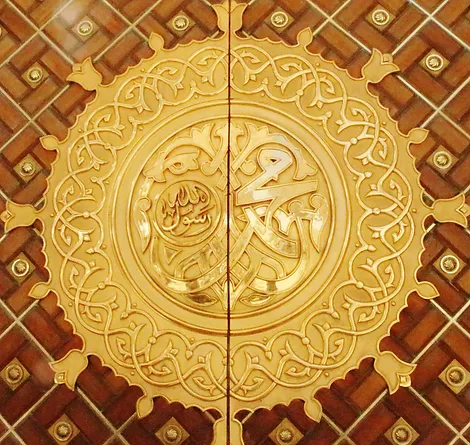
The Birth of Prophet Muhammad (s.a.w.w)
Prophet Muhammad (a.s) was born in a special year called ‘the year of the elephant’. In that year, Abraha, the governor of the Abyssinian king marched towards Makkah with a huge army of elephants to destroy the Kaaba, the house where Allah (s.w) is worshipped. It is also known as the ‘house of Allah’
But just as they were close to the Kaaba, Allah (s.w.t) sent many flying creatures who carried pebbles and threw them onto the army of men and elephants and destroyed them all and the Kaaba became safe again. This was a big miracle, and it was never forgotten that Allah (s.w.t) is the protector of all things.
Abdullah, Prophet Muhammad’s father, died three months before he was born. So the Prophet never met his father.
Prophet Muhammad’s (s.a.w.w) childhood
The Prophet’s mother was Aminah, a pious and gentle woman. However, when he was a baby, she did not have enough milk for him. In those days, when mothers could not suckle their children because they did not have milk, their babies were given to healthy strong women to look after them and give them milk.
Prophet Muhammad (s.a.w.w) was therefore given the milk of a wet nurse named Halima who was a good, strong woman. With the gentle and pure love of Halima and his mother Aminah, Prophet Muhammad started to grow into a well-mannered and polite boy.
When he turned six, the Prophet’s mother Amina became sick and died and he became an orphan without a mother or father. However, Allah (swt) always has a plan and instead his loving grandfather started caring for him.
When he turned eight, the Prophet’s grandfather also died, and his uncle Abu Talib started to look after him just like he took care of his other children. Abu Talib had a son called Ali who became very close to Prophet Muhammad (s.a.w.w) and later became the first Imam of the Muslims.
The Prophethood of Muhammad (s.a.w.w)
Muhammad (s.a.w.w) grew up to be a handsome, honest and hardworking young man who used to help his uncle in trade by selling goods in far away cities. The Prophet (s.a.w.w) married a woman named Khadija who was very wealthy but also very kind.
The Prophet used to like to spend time in a cave called the Cave of Hira on top of a tall mountain, called Jabal Al-Nour. He went there for many years, and there he used to pray to Allah (s.w.t) and think about all the amazing things that He created.
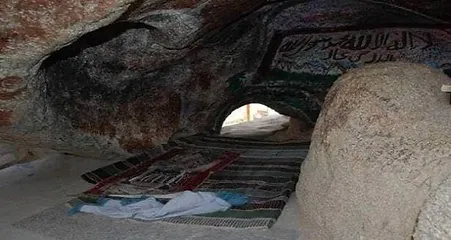
One day, when the Prophet (s.a.w.w) was forty years old, the angel Gabriel appeared while he was worshipping. angel Gabriel told him that his mission as the last Prophet of Allah (swt) had just begun, to teach people about Islam along with the following verse from the Qu’ran, the book of Allah (swt):
“Recite in the name of your Lord Who created. Created man from a clot. Recite and your Lord is most Generous. Who taught (to write) with the pen. Taught man what he knew not.” Holy Qur’an (96:1-5)
Muhammad’s (s.a.w.w) heart was filled with joy, and he thanked Almighty Allah (s.w) for this great honour. He hurried to his house to tell his wife Khadija (a.s) that his mission of Prophethood had started. The first woman who accepted him as a prophet was Khadija (a.s) and the first young man was his cousin Ali (a.s) .
During his life, Prophet Muhammad taught the people all about the manners of Islam, how to be kind and live peacefully with others through his actions and the Holy Quran. Today there are many Muslims all over the world who live a happy life because of Islam.
Prophet Muhammad’s Battles- and his Greatest Victory
Not everyone was happy that Muhammad (s.a.w.w) had been chosen as the Prophet, and many people wanted to stop him from teaching others about Islam. Mecca was like the capital city in the Arabian Peninsula in that time (like Washington is for the USA) and it was under the control of the pagans who forced Prophet Muhammad (s.a.w.w) to migrate to Medina.
Unfortunately, the pagans did not let the Muslims live peacefully in Medina or to spread the word of Allah (swt). As a result, Prophet Muhammad (s.a.w.w) was involved in many battles to protect the rights of the Muslims. Islam achieved many victories in battles that are now famous, such as the battles of Badr, Khandaq and Khaybar but the conquest of Mecca was the most important one according to the Quran.
The conquest of Mecca was Islam’s biggest victory as it involved a diplomatic, peaceful conquest. It was foretold in Surat al Nasr.
The conquest of Mecca happened on the 10th of Ramadan. The prophet ordered the army to move from Medina to Mecca because the Quraish leader ‘Abu Sufian’ broke a peace agreement between the Muslims and the Non-Muslims. The Prophet (s.a.w.w) prepared the army and they moved towards Mecca.
As they reached closer to Mecca the Prophet (s.a.w.w) ordered the army to scatter fire at night-time and kindle lights to scare the enemy. The desert became full of flames and light and noise of the army moving, and its camel’s horses scared Abu Sufian and the other leaders of Quraish.
They were so terrified that they surrendered immediately and ordered all the rest of the Meccan’s to surrender as well. The Prophet therefore entered and controlled Mecca peacefully, without shedding any blood or engaging in fighting.
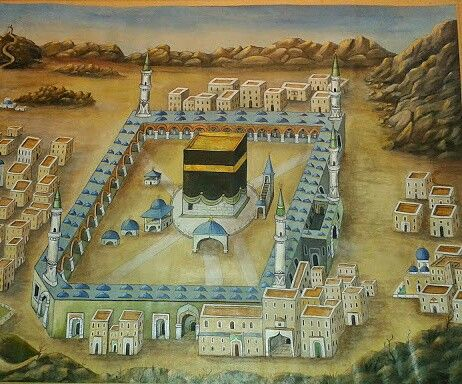
Prophet Mohammad’s (s.a.w.w.) Important Mission: Eid al Ghadeer
During Prophet Mohammad’s (s.a.w.w) last Hajj angel Gabriel revealed the following verse:
“يَا أَيُّهَا الرَّسُولُ بَلِّغْ مَا أُنزِلَ إِلَيْكَ مِن رَّبِّكَ وَإِن لَّمْ تَفْعَلْ فَمَا بَلَّغْتَ رِسَالَتَهُ وَاللَّـهُ يَعْصِمُكَ مِنَ النَّاسِ إِنَّ اللَّـهَ لَا يَهْدِي الْقَوْمَ الْكَافِرِينَ
O, Messenger! Proclaim that which has been sent down to you from your Lord, and if you do not you will not have proclaimed His message and Allah shall protect you from people, indeed Allah do not guide the faithless lot.”— Qur’an 5:67

Through this verse Allah (swt) ordered Prophet Mohammad (s.a.w.w) to tell all the Muslims that Imam Ali (a.s) is to be the leader of the Muslims after he dies.
This was an important mission and the Prophet took it very seriously.
The Prophet (s.a.w.w) gathered all the people who were returning from hajj and stood up on a high place. He took Ali’s (a.s) hand and said “Whomever I am his mawla then Ali is his mawla”. In the Arabic language mawla means Guardian and leader.
He also said “O God! Befriend and be the wali of anyone who loves Ali and considers him as his wali; be the enemy of anyone who is his enemy; and assist anyone who assists him and abandon anyone who abandons him.”
This day became known as ‘Eid al Ghadeer’. It is a happy occasion for all Muslims because on that day the Prophet announced to thousands of people returning home from Hajj that Ali is his successor.
Prophet Mohammad’s (s.a.w.w.) Death
The Prophet (s.a.w.w) was resting in the lap of Ali Ibn Abi Talib, as he was breathing his last breaths. In this time, he was passing the treasures of wisdom onto Ali, and teaching him many hidden truths. While Ali was busy performing the burial rites of the Prophet, other people in the Islamic nation were having meetings, planning on how to take the leadership of the Muslims away from Ali (a.s).
Prophet Mohammad’s (s.a.w.w.) Family
“Ahlul Bayt” is the name of the most beloved members of Prophet Mohammad’s family. The ahlul bayt include the Prophet Mohammad (s.a.w.w) , his daughter Fatimah (a.s) , her husband Imam Ali (a.s) and their children Hassan (a.s) and Husein (a.s) and the nine Imams (a.s) who are their descendants.
The Ahlul Bayt (a.s) were all infallible people. This means that they never committed a sin even though they could. This is because they could see the true ugliness of sins and the real beauty of obeying Allah.
The Islamforkids.org website introduces Islam to kids. Here, there is always an opportunity for learning more about our noble Imams (a.s), our knowledgeable Prophets (a.s) and the the tragedy of Karbala.
Useful Links
- al-Islam.org
- sistani.org
Subscribe Now
Don’t miss our future updates!
©2022. All right reserved & copyright by IslamForKids

You are using an outdated browser. Please upgrade your browser to improve your experience.

The Kindness of Prophet Muhammad (s)

The Prophet Muhammad taught love, kindness and compassion to his people, and was seen to be the most loving, kind, and compassionate of all of them. The Quran mentions his kind and gentle behavior in these words: "O Messenger of Allah! It is a great Mercy of God that you are gentle and kind towards them; for, had you been harsh and hard-hearted, they would all have broken away from you" (Quran 3:159 ).
There are many instances that show his kindness and gentleness, especially to the weak and the poor. Anas, who was his helper, said: "I served Allah's Messenger for ten years and he never said to me, 'Shame' or 'Why did you do such-and-such a thing?' or 'Why did you not do such-and-such a thing?'" (Bukhari, 2038).
Once he said to his wife: "0 'A'ishah! Never turn away any needy man from your door empty-handed. 0 'A'ishah! Love the poor; bring them near to you and God will bring you near to Him on the Day of Resurrection". He also went much further on to say: "Seek me among your weak ones, for you are given provision, or you are given help only by reason of the presence of your weak ones". (Rahman, Encyclopedia of Seerah, VOL. VIII, p. 151) God Almighty is Kind, and the Prophet imitated Allah's example in its perfection by showing kindness to his servants and all creatures without any regard for their beliefs, color or nationality. The Prophet said: "God is kind and likes kindness in all things" (Bukhari, 6601).
His heart ached within him at the corrupt state of his fellow-Meccans and their rejection of One God. The Holy Quran testifies to it in these words: "0 Muhammad, you will, perhaps, consume yourself with grief because the people do not believe" (Quran 26:3 ) . In Surah Kahf, we read: "Well, 0 Muhammad, it may be that you will kill yourself for their sake out of sorrow if they do not believe in this Message." (Quran 18:6 ) . And Surah Fatir says: " So let not your life be consumed in grief for their sake." (Quran 35:8 ).
He took a great interest in the welfare of all people and had great compassion for people in trouble. The Prophet Muhammad imitated the attributes of God par excellence and translated them into practice in the highest form possible for man. Kindness is an attribute of Allah, which has no limits. It is extensive and encompasses all things and all beings without discrimination. Likewise was the kindness of the Prophet. He extended it to all beings, both animate and inanimate and benefited all without measure. The Quranic words for the Prophet's kindness, ra'ufun rahirn (Quran 9:128 ) are very intensive and comprehensive in meaning and convey the true nature and extent of the Prophet's kindness to people. The Prophet said: "One of the finest acts of kindness is for a man to treat his fathers' friends in a kindly way after he has departed" (Abu dawud, 5123)
The issue of treating friends well was also extended to include relations: "He who wishes to have his provision enlarged and his term of life prolonged should treat his relatives well" (Bukhari, 5985). He emphasized on this matter because he deeply held the view that "Only kindness prolongs life, and a person is deprived of provisions for the faults he commits" (Ibn Majah). Bahz b. Hakim, on his father's authority, said that his grandfather told him that he had asked Allah's Messenger to whom he should show kindness and that the Prophet had replied: "Your mother." He asked who came next and he replied: "Your mother." He asked who came next and he replied for the third time: "Your mother." He again asked who came next and he replied: "Your father, then your relatives in order of relationship" (Abu dawud, 5120). He dwelled on the issue of treating orphans humanely as he stated that "The best house among the Muslims is one which contains an orphan who is well treated, and the worst house among the Muslims is one which contains an orphan who is badly treated" (Ibn Majah, 3679). This means that the Prophet cautioned his followers against general maltreatment of anyone regardless of his status. By extending good treatment from friends to relatives and now to neighbors, Prophet Muhammad was intent in making all humans interdependent as he emphasized in the following words: "All creatures are Allah's dependants, and those dearest to God are the ones who treat His dependants kindly" (Rahman, VOL VIII, p. 154). He emphasized the kind treatment of women again and again in his speeches:
Treat women kindly, since they are your helpers; . . . you have your rights upon your wives and they have their rights upon you. Your right is that they shall not allow anyone you dislike to enter your bed or your home, and their right is that you should treat them well. (from the Farewell Sermon of the Prophet)
Once a number of women complained to the Prophet's wives about their ill-treatment by their husbands. On hearing of this, the Prophet said: "Such persons among you are not good persons." (Abu Dawud, 1834). This condemnation by the Prophet himself was an indication that no one will be accepted before God who, while on earth, decided to be unkind to women. Another person said to the Prophet: "0 Messenger of Allah! My relatives are such that although I cooperate with them, they cut me off; I am kind to them but they ill treat me." The Prophet said this in reply: "So long as you continue as you are, God will always help you and He will protect you against their mischief" (Muslim, 4640). This was not only a way of bringing comfort to the mind of the worried person but one of the communicative techniques of the Prophet to assure who ever found himself in that situation to look up to God to be consoled and protected. So it was pointless to preach vengeance to this kind of people suffering from this similar fate. Indeed, Prophet Muhammad was nothing short of a competent counselor.
He was always counseling people to be goodhearted regardless of their sex, age or gender. Once Asma bint Abu Bakr's mother, who was still an unbeliever, came to see her in Madinah. She told this to the Prophet and said: "My mother has come to see me and she is expecting something from me. May I oblige her?" The Prophet said: "Yes, be kind to your mother" (Muslim, 2195). This attitude of the Prophet was equally extended to Zainab as-Saqafia, the wife of Abdullah ibn Mas'ud and an Ansari woman. She went to see the Prophet and to inquire whether it would be a charity if they spent something on their husbands and on the orphans under their care. The Prophet said: "They will get a two-fold reward, one for kindness towards their relatives and the other for charity" (Bukhari, 1466).
There are many Ahadith concerning his kindness to animals, birds and insects: "God prescribed kindness towards everything; so when you slaughter any animal, slaughter it well; when you sacrifice, make your sacrifice good. And let everyone sharpen his weapon and make it easy for his sacrificed animal" (Muslim, 5055). He made this kind of statement to demonstrate his love for both humans and animals. In essence, Prophet Muhammad was equally showing his followers that he too is feels pain.
Source: Prophet Muhammad Leadership
Related Suggestions

Welcome to the New IslamiCity
Let's begin.
Topics Menu - Always one click away
Site search & most popular, login & login status, main hubs & home pages, inspiring themes.
We feature each theme with a beautiful image. Click on these beautiful images & start exploring the theme/value behind it.

Essay on Prophet Muhammad (Peace Be Upon Him)
Muhammad (peace be upon him) was the prophet who founded the religion of Islam. Followers revere him as a teacher, leader, and holy man. He was known for Kindness, honest, and starting a great empire in a span of 23 years of Movement. He believed only in one God and established rules to live a good life that would lead to paradise.
Essay on Prophet Muhammad (Peace Be Upon Him) – 200 Words
Prophet Mohammed (peace be upon him) was born on 29th August 570AD, in Mecca, the birthplace of Islam.
His mother, Aminah (R.A), belonged to a wealthy family named Banu Hashem .
He lost his father before his birth and his mother after a short while. He was raised by his grandfather and uncle. They taught him to worship Allah SWT, but he did not believe them because they were illiterate. At this time, the Arabian people lived in a country full of sand and heat. Since they had a very long way to travel, they were to stay away from other nations and religions.
They lived without any law or order, not even following their faith Prophet Mohammad(peace be upon him) decided at the age of 25 to change his life. He married a widow named Khadija (R.A), who was 15 years older than him and wealthy. The Prophet(peace be upon him) migrated with his family to Madinah in 622 CE (21st September 622), now Saudi Arabia.
The Prophet Muhammad (peace be upon him)had a vision of the angel Gabriel while meditating on Mount Hira. He was only 40. Mohammad the Prophet (peace be upon him) appeared in Arabia. His first believer was his wife, Khadijah (R.A). Mecca was the birthplace of Muhammad (peace be upon him) (the prophet of Islam) in 570 A.D.
He later moved to Medina, where he laid the foundations for his new religion, Islam. Mecca capitulated to Muhammad’s requests and even migrated to Medina after Muhammad (peace be upon him) overthrew them.
Essay on Prophet Muhammad (Peace Be Upon Him) – 500 Words
Muhammad (peace be upon him) was the prophet who founded the religion of Islam. Followers revere him as a teacher, leader, and holy man. He was known for Kindness , honest, and starting a great empire in a span of 23 years of Movement. He believed only in one God and established rules to live a good life that would lead to paradise.
Muhammad (peace be upon him) was a merchant, but at the age of 40, he began receiving revelations from Allah. These revelations were the basis for the Quran, and they would ultimately create one of the most influential religions in history.
Islam is a fast-growing religion with over 1.8 billion followers, making it the second-largest religious denomination in the world today. Its founder Muhammad was born in Mecca around 570CE and is believed to have been a direct descendant of Abraham through his third son Ishmael.
Life of Muhammad (peace be upon him)
Despite growing up in poor conditions, Muhammad(peace be upon him) overcame many difficulties to become an influential religious and political leader. Muhammad (peace be upon him) was born around 570 CE in Mecca, Arabia. His father, Abdullah, died before Muhammad (peace be upon him) was born, and so he was raised by his grandfather Abdul-Muttalib. When Abdul-Muttalib passed away when Muhammad (peace be upon him) was six years old, his mother, Amina.
He belongs to the Quraysh tribe, one of the oldest and most influential families in the city.
His childhood was spent wandering around their caravansary, where he learned the local tribal customs and dialects. Then, around the age of twenty, Muhammad began a trading business with his uncle Abu Talib, who took numerous voyages to Syria.
The Kaaba, the most famous of all the temples in Mecca, was not originally a place of worship for any specific god. It was simply a traditional location for people of all beliefs to meet and pray together. Despite praying to different idols and gods, worshippers gathered together in peace. Muslims would regularly make pilgrimages to the Kaaba to worship their god in such a holy place.
At the age of 25, Muhammad (peace be upon him) went into business with Khadijah, a woman 15 years older than him. Known for her intelligence and shrewd business sense, Muhammad took to the arrangement. In time he came to admire Khadijah as well, and the two married when he was 25.
Muhammad’s (peace be upon him) religious convictions led him to create one of the most influential religious movements in history. In 610, Muhammed claimed to have experienced a vision from God while meditating at Mount Jabal Ai-Nour.
After reaching an agreement with Mecca for the future conduct of his followers, Muhammad (peace be upon him) made his first pilgrimage to that city. At Mount Arafat, he preached his final sermon, after which he returned home.
In his 62nd year, he died after giving 23 years of his life as an unyielding servant of Allah. The world lost a great man, but we will never forget Muhammad (peace be upon him) for leaving behind practical instructions that can make our lives full of faith and goodness.
Related Essays:
- Essay on Punctuality (200 & 500 Words)
- Essay on Quaid e Azam urdu/english (200 & 500 Words)
- Essay on Rabindranath Tagore (200 & 500 Words)
- Essay on Recycling (200 & 500 Words)
- Essay on Republic Day (200 & 500 Words)
- Essay on Respect (200 & 500 Words)
- Essay on Role Model (200 & 500 Words)
- Essay on Role of Youth in Nation Building (200 & 500 Words)
- Essay on Save Environment (200 & 500 Words)
- Essay on Save Tiger for Students and Children (200 & 500 Words)

Sana Mursleen is a student studying English Literature at Lahore Garrison University (LGU). With her love for writing and humor, she writes essays for Top Study World. Sana is an avid reader and has a passion for history, politics, and social issues.

IMAGES
VIDEO
COMMENTS
You can write the same essay under the title, Essay on the Holy Prophet (PBUH) or Essay on the Life of Hazrat Muhammad (PBUH). This is a simple and easy essay for the students of Class 10 and Class 12. Students of 2nd Year of F.A, FSC, ICS and Icom can get benefit from this essay. Life of Hazrat Muhammad (PBUH) is a role model for every Muslim.
The Life of the Prophet Muhammad Essay. Muhammad was protected from a life of oppression by his uncle, who offered him work in his effective cavalcade occupational. Married to a wealthy entrepreneur in her individual precise Muhammad's axiom immediately showed how the essential kinfolks of the Quran survived (Alalwani & Islam 2021).
The Life of Muhammad. Muhammad was born around 570, AD in Mecca (now in Saudi Arabia). His father died before he was born and he was raised first by his grandfather and then his uncle. He belonged ...
The Prophet Muhammad used numerous occasions to instruct the people to follow and adhere to his twelve appointed successors, 'Caliphs' or 'Imams', the first of whom was Imam Ali son of Abu Talib, and the twelfth is the living Imam Mahdi, who is hidden from public view12 until such a time when the Almighty will instruct him to reappear in public ...
Conclusion. Prophet Muhammad was an Islamic leader, who is considered and believed to be a messenger form God. Muslims consider Muhammad as the true prophet who restored the ancient faith of predecessors such as Abraham, Noah and Moses. Other religions consider him as the founder of Islam. His characteristics form the foundation of Islam.
Thou art Allah's messenger, and I am Jibril (Gabriel).". Then he raised his eyes and saw the angel, in the likeness of a man, standing in the sky above the horizon. And again the dreadful voice said: "O Muhammad! Thou art Allah's messenger, and I am Jibril (Gabriel).". Muhammad (peace and blessings be upon him) stood quite still ...
rapes to the Holy Prophet Muhammad as a gift. He was very excited t. be able to bring a gift for the Prophet (s). He placed the grapes beside the Prophet (s) and said, 'O Prophet of Al. ah, please accept this small gift from me'. He was a poor man who could not afford more. His face beame. with happiness as he offered his small gift. I.
In 570 CE, Muhammad was born in Mecca where he grew up under Islamic traditions, which shaped his growth during childhood (Peterson 34). Muhammad was the only child of Amina bin Wahb and Abd bin Al-Muttalib. Get a custom essay on Muhammad's Life and Its Significance. 182 writers online.
Muhammad (pbuh) would often leave the crowded city and go to the cave in Mount Hira'. He liked to be alone there, away from all thoughts of the world and daily life, eating and drinking little. In his fortieth year, Muhammad (pbuh) left Mecca to spend Ramadan, the traditional month of retreat, in the cave.
A Mercy for Women. Prophet Muhammad was also very kind and affectionate towards women. Women were very badly treated in those times. The Noble Prophet gave them honor and dignity at par with men in the community. 'Umar reported: "We did not have much regard for women while we were at Makkah, but they were better treated in Madinah.
The Prophet's Life in Brief. Birth and Rearing. Muhammad was born in Makkah on Rabi` Awwal 12, 570 CE. His father died before his birth. The infant Muhammad was handed to a Bedouin wet nurse to be brought up by her in the healthy atmosphere of the desert. At the age of five, Muhammad returned to the care of his mother, Aminah bint Wahb, but ...
In March of 632 CE, on Mount Arafat, the Prophet gave out his last sermon. He later went back to Medina. There, a deadly illness attacked him and he sadly never recovered. On 8th June 632, the Prophet Muhammad (in his early 60s) took his last breath. There are conspiracy theories that the Prophet was poisoned.
Get original essay. Muhammad was born in Mecca (in present-day Saudi Arabia) in 570 ce. Orphaned at an early age, he was brought up by his uncle, Ibn Talib, head of the Banu Hashim clan in the Quraysh tribe which dominated Mecca. He was therefore born into a powerful and influential society. He worked as a merchant and a shepherd and married at ...
The society was oppressive and dangerous. They indulged in alcohol, gambling, blood feuds, and trading of women and slaves. Muhammad was born in Makkah in the year 570 C.E. to a trader named 'Abdullah and his wife Amina. The family was part of the respected Quraish tribe. Tragically, 'Abdullah died before his son was born.
This document provides a summary of the life story of the Prophet Muhammad in 3 paragraphs. It describes that he was born in Mecca in 571 AD, became an orphan at a young age, and worked as a merchant before marrying Khadijah. It then discusses how he began receiving divine revelations from God through the angel Gabriel and worked to spread the message of monotheism. It outlines the basic ...
iii About the Author The Promised son ra of the Promised Messiah and Mahdi as; the manifest Sign of Allah, the Almighty; the Word of God whose advent was prophesied by the Holy Prophet Muhammad sa and the Promised Messiah as as well as the past Prophets; a Star in the spiritual firmament for the like of which the world has to wait for
According to Abdul-Kareem al-Sheba, (2006) Prophet Muhammad was always sincere. He was honest in everything he did as God had ordered him. Allah said that his prayer, means of forfeiture, life, and death are for God. According to Mustafa as-Sibaa, (2003) Prophet (Pbuh) had considerable companionship, ethics, and morals.
This text unfolds the life of the Prophet of Islam in a structured narrative, from the obscure era of pre-Islamic Arabia to the profound impact of his teachings. Explore the Prophet's formative years, his marriages, and the philosophical underpinnings of his actions. Delve into the challenges faced during his public mission, migration, and the establishment of Islamic fraternity.
According to Islamic belief, Muhammad was the only person to see Heaven and Hell while still alive. After the Prophet's Death: Emergence of Shi'i and Sunni Sects of Islam. When Muhammad died in 632, he had not named a successor. One faction, the Shi'a, believed that only individuals with direct lineage to the Prophet could guide the Muslim ...
The Birth of Prophet Muhammad (s.a.w.w) Prophet Muhammad (a.s) was born in a special year called 'the year of the elephant'. In that year, Abraha, the governor of the Abyssinian king marched towards Makkah with a huge army of elephants to destroy the Kaaba, the house where Allah (s.w) is worshipped. It is also known as the 'house of Allah'.
The Prophet said: "God is kind and likes kindness in all things" (Bukhari, 6601). His heart ached within him at the corrupt state of his fellow-Meccans and their rejection of One God. The Holy Quran testifies to it in these words: "0 Muhammad, you will, perhaps, consume yourself with grief because the people do not believe" (Quran 26:3).
The Prophet (peace be upon him) migrated with his family to Madinah in 622 CE (21st September 622), now Saudi Arabia. The Prophet Muhammad (peace be upon him)had a vision of the angel Gabriel while meditating on Mount Hira. He was only 40. Mohammad the Prophet (peace be upon him) appeared in Arabia. His first believer was his wife, Khadijah (R.A).